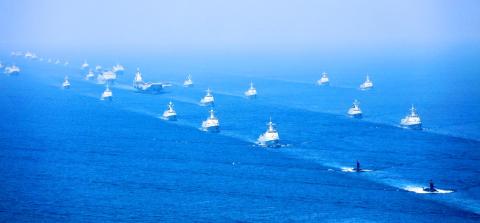Taiwan and Japan should confront China’s aggressive maritime patrols by making simulated attacks against the Chinese People’s Liberation Army Navy (PLAN) aircraft carrier Liaoning, retired US Navy admiral Dennis Blair said on Wednesday last week.
Blair, who served as national intelligence director under former US president Barrack Obama, made the remarks in an article discussing China’s maritime and air activity published on the Sasakawa Peace Foundation’s Web site, an organization he chairs.
In the article, Blair said that Taiwan and Japan’s practice of scrambling their forces to intercept and escort each Chinese air and maritime patrol, which he termed “intercept everything,” is wasteful and counterproductive.

Photo: Xinhua via AP
Such operations use up valuable flying time, strain limited budgets and achieve little in terms of military value, while creating a pattern of reactions that the PLA could exploit in war, he wrote.
Under the “intercept everything” policy, Taiwan and Japan are degrading the combat readiness of their forces to defend their territory and lowering their ability to deter Chinese military aggression, he added.
Taiwanese and Japanese forces should instead make their response selective, unpredictable and unrevealing of their full capabilities, while exercising their right under international law to occasionally patrol near Chinese territory and ignore Chinese protests, he wrote.
“Taiwanese forces should take advantage of [the PLAN carrier’s] presence to carry out simulated attacks against the Liaoning, raising their own readiness and demonstrating the reality that the Liaoning is vulnerable under wartime conditions,” he wrote, adding that Taiwanese and Japanese should understand that it is wartime capabilities, not peacetime operations, that deter potential aggressors from taking military action.
The two nations’ leaders should communicate to their respective citizens that ship and aircraft movement in peacetime do not reflect their ability under wartime conditions, he wrote.
The Liaoning — a refurbished Kuznetsov-class vessel and China’s sole aircraft carrier — has participated in 10 patrols and drills near Taiwan, four of which occurred this year, including a launch and recovery exercise in the Pacific.
When asked to comment, a Ministry of National Defense official said the military deems the shadowing of Chinese aircraft and ships by our forces a necessary policy for national security.
The military’s ground-based missile batteries, warships and fighters are well armed with Hsiung Feng and Harpoon anti-ship missiles, the source added.

The CIA has a message for Chinese government officials worried about their place in Chinese President Xi Jinping’s (習近平) government: Come work with us. The agency released two Mandarin-language videos on social media on Thursday inviting disgruntled officials to contact the CIA. The recruitment videos posted on YouTube and X racked up more than 5 million views combined in their first day. The outreach comes as CIA Director John Ratcliffe has vowed to boost the agency’s use of intelligence from human sources and its focus on China, which has recently targeted US officials with its own espionage operations. The videos are “aimed at

STEADFAST FRIEND: The bills encourage increased Taiwan-US engagement and address China’s distortion of UN Resolution 2758 to isolate Taiwan internationally The Presidential Office yesterday thanked the US House of Representatives for unanimously passing two Taiwan-related bills highlighting its solid support for Taiwan’s democracy and global participation, and for deepening bilateral relations. One of the bills, the Taiwan Assurance Implementation Act, requires the US Department of State to periodically review its guidelines for engagement with Taiwan, and report to the US Congress on the guidelines and plans to lift self-imposed limitations on US-Taiwan engagement. The other bill is the Taiwan International Solidarity Act, which clarifies that UN Resolution 2758 does not address the issue of the representation of Taiwan or its people in

US Indo-Pacific Commander Admiral Samuel Paparo on Friday expressed concern over the rate at which China is diversifying its military exercises, the Financial Times (FT) reported on Saturday. “The rates of change on the depth and breadth of their exercises is the one non-linear effect that I’ve seen in the last year that wakes me up at night or keeps me up at night,” Paparo was quoted by FT as saying while attending the annual Sedona Forum at the McCain Institute in Arizona. Paparo also expressed concern over the speed with which China was expanding its military. While the US

SHIFT: Taiwan’s better-than-expected first-quarter GDP and signs of weakness in the US have driven global capital back to emerging markets, the central bank head said The central bank yesterday blamed market speculation for the steep rise in the local currency, and urged exporters and financial institutions to stay calm and stop panic sell-offs to avoid hurting their own profitability. The nation’s top monetary policymaker said that it would step in, if necessary, to maintain order and stability in the foreign exchange market. The remarks came as the NT dollar yesterday closed up NT$0.919 to NT$30.145 against the US dollar in Taipei trading, after rising as high as NT$29.59 in intraday trading. The local currency has surged 5.85 percent against the greenback over the past two sessions, central